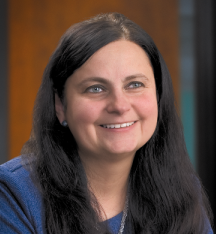
For many students at the Frances Payne Bolton School of Nursing at Case Western Reserve University, finding a way to pay for their advanced nursing degrees just got easier.
The U.S. Department of Health and Human Services awarded the nursing school a $3.16 million Nurse Faculty Loan Program (NFLP) grant—the largest among 93 accredited college and nursing programs receiving grants for the current academic year.
The Health Resources and Service Administration’s (HRSA) Nurse Faculty Loan Program award made it possible to provide loans covering full tuition to 28 new full-time, 28 part-time and 79 returning Case Western Reserve University graduate nursing students.
Jaclene Zauszniewski, who has directed the nursing school’s Nurse Faculty Loan Program since its inception in 2004, said the grant reflects the quality of nursing education program at Case Western Reserve.
The goal of the grant, which has a required educational component to teach for four years after graduation, is to increase the nation’s faculty in nursing on college campuses across the country.
The $3.16 million commitment is also the largest ever received by the Frances Payne Bolton School of Nursing since the first round of funding in 2004. It is among the largest grants issued to academic institutions nationally for the Nurse Faculty Loan Program.
In that first funding year, the school was awarded $140,000. Since that time, HRSA loans have supported 71 Master of Science in Nursing (MSN) students, 147 doctors of nurse practice and 14 PhD students.
Nursing students, regardless of household income, can receive HRSA loans to help pay for full tuition for five years. Tuition varies by program. The funds are earmarked for tuition in graduate-level programs.
In return, students are required to take three courses (six credit hours) related to teaching, whether education courses are part of the curriculum, as in some MSN education tracks, or not.
After graduating, the students also agree to secure and maintain full-time teaching positions for four years at accredited U.S. schools of nursing on college or university campuses that focuses on training nurses and nurse educators.
Zauszniewski, the Kate Hanna Harvey Professor of Community Health, said the hope is that these graduates will continue teaching after their obligation ends.
If students meet the requirement, HRSA forgives 85 percent of the loan. Students must repay the full amount borrowed at the prevailing interest rate if they do not meet the employment requirement. Borrowers have 10 years to repay the loan.
The loan program provides a pipeline of nursing educators to help fill gaps in teaching faculty at universities created by an aging and retiring workforce, Zauszniewski said.
Zauszniewski works with Dedra Hanna-Adams, the nursing school’s director of financial aid, to monitor the use of the funds and communicate with students about the loan’s goals and obligations.
The lack of educators has caused some nursing schools to close because they can’t reach the required faculty-to-student ratio, which can vary from state to state, Zauszniewski said.
